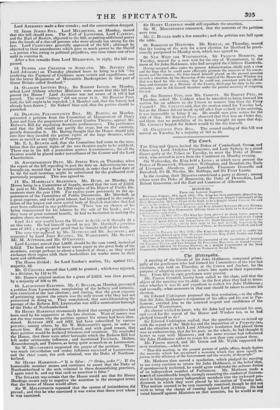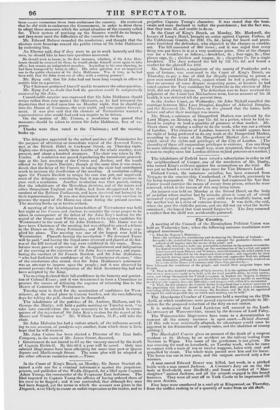"Clic ilictropoTil.
A meeting of the friends of Sir John llobliouse, composed princi- pally of the gentlemen who had formed his Committees at the two last elections, was held on Thursday, at the Crown and Anchor, for the purpose of adopting measures to return him again as their representa- tive. From fifty to sixty gentlemen were present.
Mr. Pascoe Grenfell, having. been called to the chair, said that the object of the meeting was twofold : in the first place they had to deter- mine whether it was fit and expedient to reelect Sir John Hobhouse ; and secondly, what measures in that case should be taken to secure his election.
Sir Edward Codrington proposed the first resolution,—to the effect that Sir John Hobliouse's resignation of his office and his seat in Par- liament, entitled him to the renewed respect and confidence of the electors of Westminster. An elector wished to know, why Sir John had not retained his seat, and voted for the repeal of the House and Window tax, as he had pledged himself to do ? Sir Edward Codrington replied, that the question was so mixed up with the repeal of the Malt-tax and the imposition of a Property-tax, and the situation in which Lord Althorp's resolution had placed them was so embarrassing, that for his part, on the whole, he had thought it better to vote with Ministers ; and the same reasons had influenced Sir John Hobhouse rather to resign his seat than vote against them. Mr. Fearon moved, and Mr. Green and Mr. Wylde supported the next resolution,—which was " That this meeting, in the present posture of public affairs, deeply deplore. the necessity which has occasioned a secession which they deem equally in- jurious to the efficiency of the Government and the security of the people." Mr. Methuen then moved a resolution, which pledged the meeting to use every exertion to return Sir John Hobhouse, in the belief that, if spontaneously reelected, he would again undertake the arduous ditties of an independent member of Parliament. Mr. Methuen made a speech of considerable length, strongly censuring the conduct of Govern- ment in bringing so many independent members into the awkward pre- dicament in which they were placed by his motion of Tuesday last. That motion seemed to be very cunningly contrived, though he did not wish to bring the charge of cunning against Lord Althorp. He had voted himself against Ministers on that occasion, for he would at any
flute lasttier entuarrass them than embarrass the country. He confesed that he did wish to embarrass the Government, in order to drive them to adopt those measures which the actual situation of the country called for. Their system of patching up the finances would do no longer, and they must meet the difficulties of the country in the face.
Mr. Edward Bulwer seconded the resolution ; and thought that the electors were boundto reward the public virtue of Sir John Hobhouse by reelecting him.
An Elector said, that if they were to go to work honestly and like men, be should like to have two questions answered.
He should wish to know, in the first instance, whether, if Sir John Hob- house should be returned by them, he would pledge himself never again to take office, but remain an independent member. According to his own showing, he had been hampered by being in office. His other question was an impel taut one to the public character of Sir John Hobhouse. Was it true, as he had been told, that Sir John went out of office with a retiring pension?
Mr. Byng said, that Sir John had not been long enough in office to entitle him to a pension.
The Chairman professed himself unable to answer the other question. Mr. Byng had no doubt that both the questions would be satiyiwiorily answered by Sir John.
Considerable surprise was expressed that Sir John Hobhouse should resign rather than vote against the Ministers, as he had informed the deputation that waited upon him on Monday night, that he should go into the House of Commons, the next night, and vote against Govern- ment. It was also said that the electors of Westminster wanted a representative who would lead and not require to be driven.
On the motion of Mr. Ferman, a resolution was passed that measures should be taken to return Sir John Hobhouse, free of ex- pense. Thanks were then voted to the Chairman ; and the meeting broke up.



















 Previous page
Previous page